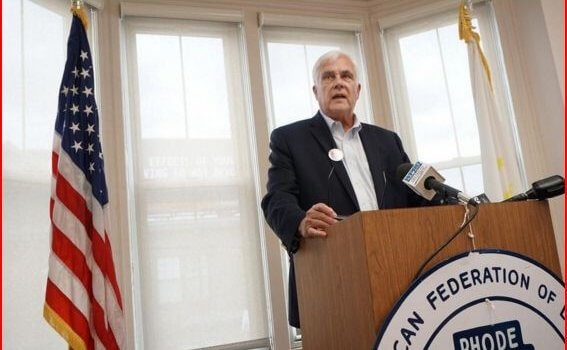By Linda Borg
“We have received very quickly, very strong support from our congressional delegation and Governor Raimondo,” George Nee, president of the Rhode Island chapter of the AFL-CIO, said at the news conference. “When you’re in a fight, it’s good to know you have friends.
“We’re going to be fine,” he added. “We will continue to organize, and we have been organizing.”
Reaction to Wednesday’s Supreme Court decision split along ideological lines in Rhode Island, with liberals calling it an attack on organized labor and conservatives hailing it as a victory for free speech.
The court, in a 5-4 vote, ruled that non-union public-sector employees are not required to pay certain union fees, even though they benefit from collective bargaining. The case, Janus v. American Federation of State, County and Municipal Employees Council 31, found that requiring non-union workers to pay fees violates their freedom of speech.
Gov. Gina Raimondo wrote that “the labor movement built Rhode Island’s middle class. This decision is part of a larger effort to weaken labor and diminish the middle class. … As long as I am governor, Rhode Island will continue to stand up for the middle class.”
She said her team will review this ruling and, if any changes are required, her administration will make them at the bargaining table.
Sen. Sheldon Whitehouse called the partisan nature of these decisions “a cancer on the credibility of the court. Celebratory tweets by Republican political leaders embracing members of the court provide a telling symbol of this breakdown.”
R.I. Attorney General Peter Kilmartin, who in January filed an amicus brief urging the U.S. Supreme Court to uphold a Seventh Circuit decision protecting “fair share” provisions in public-sector collective bargaining agreements, likewise expressed his disappointment in Wednesday’s ruling.
“It will curtail the ability for public employees to obtain fair wages and benefits. These workers are our neighbors, our teachers, police officers and firefighters, all of whom work hard each day serving our communities and contributing to our quality of life,” Kilmartin said in a news release.
“They have already had to endure severe cutbacks to pension plans, health coverage and other benefits, while paying more, and today’s decision will further erode their ability to collectively fight for livable wages, retirement security and other important protections.”
No one knows what the impact on unions will be or how fast the effects will be felt. But such a ruling could have a crippling effect on union revenues, according to the Education Writers Association. The National Education Association, the nation’s largest teachers’ union, could face a potential loss of 307,000 members over two years, according to analyst Mike Antonucci, a frequent union critic, cited in the EWA article.
“The Janus case is the most recent corporate-funded attack on public employees that seeks to silence the voice of workers,” said Jay Walsh, executive director of the University of Rhode Island Chapter of the American Association of University Professors. “Full-time faculty at URI don’t just bargain about wages and benefits. We also bargain about conditions that improve student experiences like smaller course sizes, school safety, and freedom of inquiry and expression.”
U.S. Rep. James Langevin called the ruling “a blow to working families and to the members of organized labor who are fighting for their right to earn a decent living.”
“I am appalled that the Gorsuch Court is now going after civil servants by overturning four decades of precedent and undermining their rights as employees,” he said. “Governments are not infringing on free speech by allowing workers to demand better wages.”
But the Rhode Island Center for Freedom & Prosperity, a conservative research and advocacy group, said the ruling grants workplace freedom to public employees.
“The greatest benefit will be an improvement in public education,” said Mike Stenhouse, the center’s CEO. “Many education reforms that would improve schools in disadvantaged communities are prevented by union collective bargaining agreements. If unions are no longer able to force teachers who disagree with them to fund their bargaining positions, unions will have less power to impose ineffective policies into contracts.”
“We expected this,” said Nee. “I don’t see this as a weakening at all.
“We’ve been growing and in this state we’ve been strong,” he added. “We never made progress by sitting still and accepting the status quo.”




